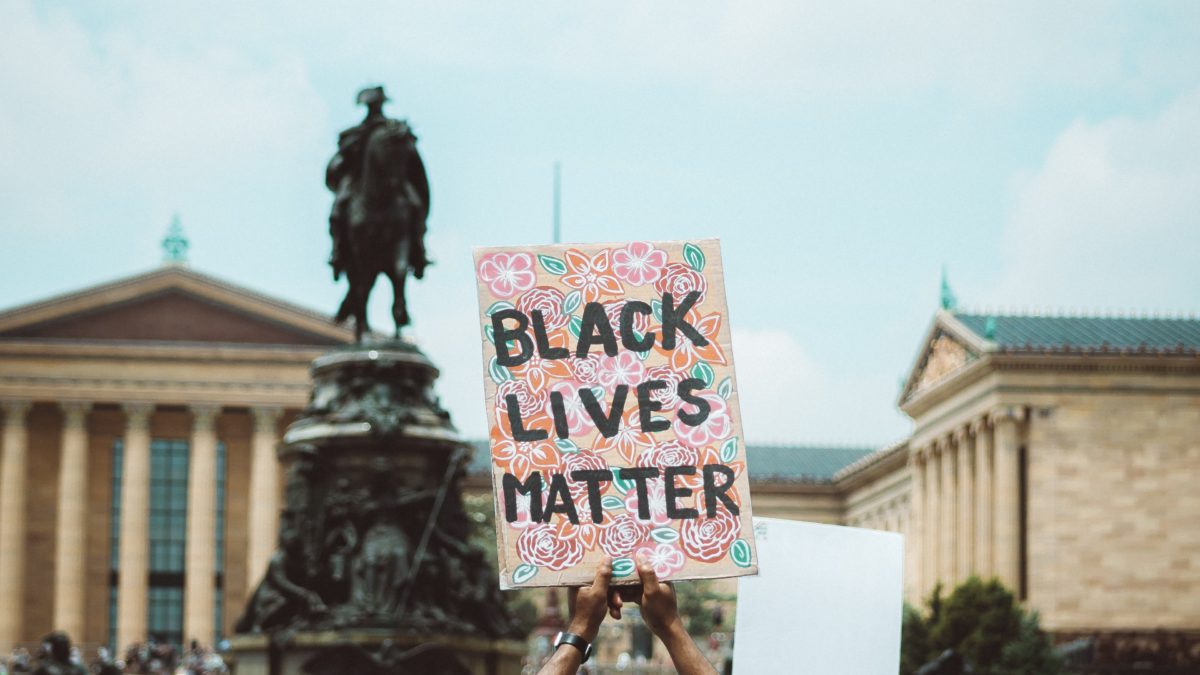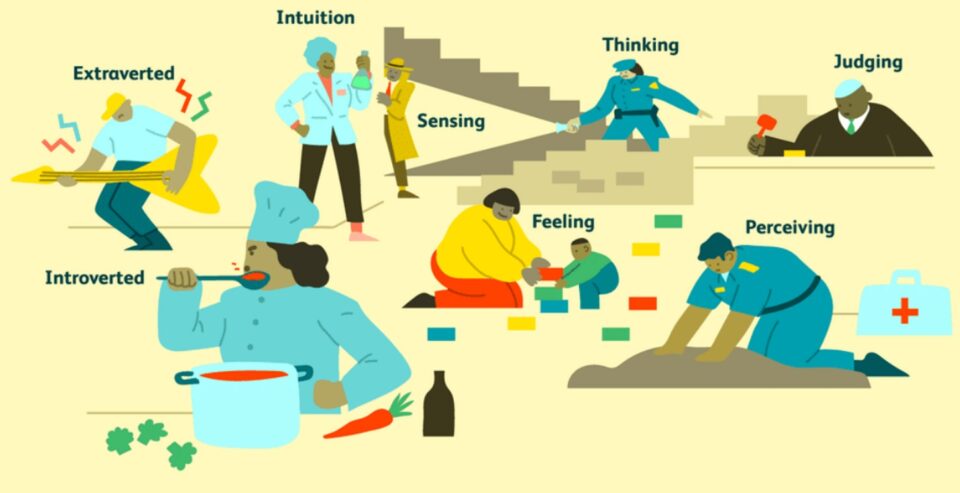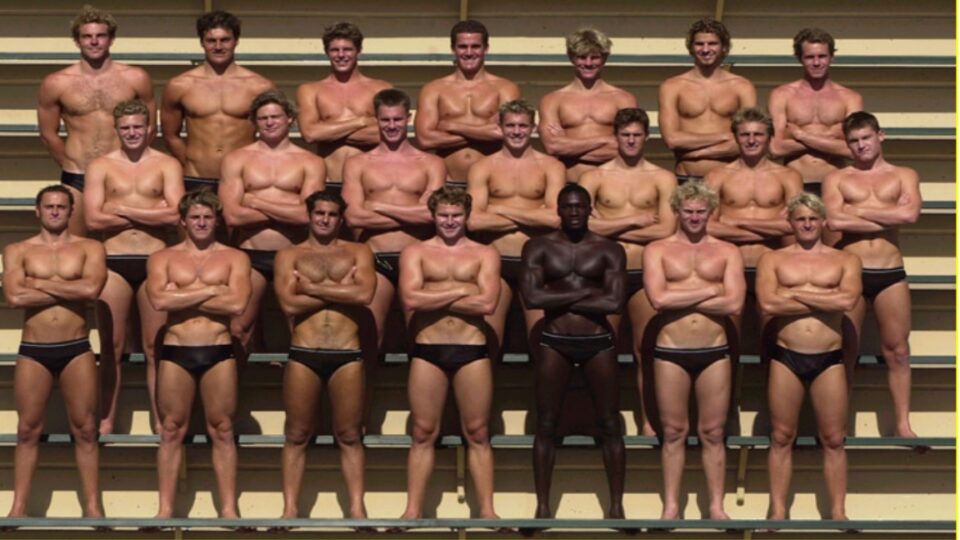Black Lives, White Lies

Black Lives, White Lies
July 12, 2020
Rev. Tony Larsen
I have wanted to do a service on the Black Lives Movement for some time--partly because this movement has shared the news spotlight with COVID-19 for several months now. And, in a strange way, the two themes have intertwined around each other--not just because both became newsworthy at the same time, but because the coronavirus has disproportionately affected black and brown people; and it has brought into focus the larger disparities between white people and people of color. Consider a few statistics with me. Black folks make up about 13% of the U.S. population. But they account for about 25% of COVID-19 cases and 25% of COVID-19 deaths. For a number of reasons: One being that many service jobs that entail a lot of interaction with the public--in hospitals, grocery stores, take-out or fast-food restaurants, etc.--are largely filled by African Americans. Also, black and brown people are more likely to live in smaller housing quarters where it's often impossible to practice social distancing. And they are more likely to take a bus to work than drive a car, again increasing the likelihood of coronavirus transmission.
So...proportionally, a black person is twice as likely to get COVID-19 as a white person, and twice as likely to die from it. (I'm not blaming any one person or group for this, by the way--it's just a fact.) Consider a few economic statistics. The poverty rate among blacks is twice that of whites. So is the unemployment rate. When it comes to home ownership, about 70% of white families own their own home; 40% of black families do. And this is not just due to differences in education levels. As a matter of fact, black college graduates are less likely to own their own home than white high-school drop-outs! Did you know that? Black college graduates are less likely to own their own home than white high-school drop-outs. And when it comes to net worth, the average African-American household owns one tenth the wealth of the average white American household. The average black household: $15,000; The average white household: $150,000.
To see why some of this is still true--despite the gains of the Civil Rights movement in the 1960's--it helps to look at a little history.
In the 1930's, the United States established Social Security. (Which is a good thing, right?) Social Security gave financial stability to a lot of older Americans, for which we can all be grateful. But at first it excluded agricultural and domestic workers (which meant that 2/3 of black Americans weren't covered). Then after World War II the U.S. moved to make it easier for Americans to own their own home. A good thing. But the policy said that the presence of black residents in a neighborhood lowered the value of homes there, so banks were able to "red-line" those districts, making it impossible for most black families to get a loan to buy a home anywhere.
(This is partly why black ownership is still way below white ownership--only 40% compared to 70%--and why the average white household has ten times the wealth of the average black household: $150,000 compared to $15,000.)
For people who think that all of this is behind us, because most white people are no longer overtly racist, overt racism is only the tip of the iceberg. The KKK, neo-Nazis, white-power advocates, etc. are just the more visible pieces of a much larger racist structure--which, if you’re white, you’re not likely to be conscious of because you don’t run into it personally. For example, recent studies have shown that when employers receive resumes for job applicants, they do discriminate--although they probably don't know that they do. When resumes were sent to employers, the ones with "white sounding" names like Emily or Greg, got 50% more callbacks than the ones with names like Lakisha or Jamal. I'll bet if you asked those employers if they used race as a consideration in hiring, they would say, "No! We didn't even have a box that asked for race. So how could I have used race to weed out applicants?" But many do, without always knowing it.
To show you how unconscious this is, an experiment was done at Princeton some years ago, where they had white college students interview job applicants--some of whom were white, some of whom were black. The experimenters videotaped the interviews and found that the white interviewers spent less time with the black applicants (than they did with the white ones), and they were less friendly and more reserved with them than they were with the white ones. (I'll bet most of these interviewers had no idea they were treating people differently because of race. They were Princeton college students, after all.)
Now, you may not be all that surprised at this. You might even expect it. But the really interesting part came later. After watching the videotapes, the experimenters decided to get interviewers together and train half of them to be friendly and the other half to be reserved. And then they had them interview a bunch of applicants, but this time all the applicants were white. And they found that the applicants who were interviewed by the unfriendly interviewers were more nervous, and didn't do as well as the ones who had friendly interviewers. Now, these were all white applicants, so it's not that some did worse because of their race. They did worse because they were treated differently.
You see, when white applicants are treated the way black applicants are usually treated, they don't do as well in their interview.
Now, think about the implications: You're interviewing people for a job. You don't think you're prejudiced. But, unbeknownst to you, you act differently toward the black applicants than you do with the white applicants. Consequently, the white applicants do better. And you say, "Gee, I tried not to be prejudiced, but the white applicants were just better, that's all." You see, you don't have to be consciously racist to be affected by a culture of racism.
Here’s an example that may apply to policing. An intriguing experiment was carried out at the University of Colorado. They had volunteers play a video game that tested reaction times. The game showed a series of photographs of people who were holding something in their hand. In half of the pictures it was a handgun; in the other half it was a cell phone. And the pictures went by fairly rapidly. The object of the game was to shoot at the picture (with your own toy gun) if the person in the picture was holding a gun--but not if he was holding a cell phone. Naturally, many people made mistakes and sometimes shot at a picture where there was no gun-- or didn’t shoot when there was. But what was interesting was that when white participants were shown a picture of a black person, they were much more likely to mistake a cell phone for a gun and shoot--than when the person in the picture was white. Not only that, but the white volunteers tended to shoot faster when they saw a black person in the picture.
People often think that police officers are the ones who are racist or trigger-happy. But unconscious racism is there in all of us, and may pop up in odd ways.
A couple months ago (in late May-- actually on the very day George Floyd was killed) an African-American bird-watcher in New York's Central Park told a white woman that she was supposed to leash her dog in that part of the park. She took umbrage at his gall in pointing this out, and as he videotaped her with his phone she called the police and told them her life was being threatened by an African-American man. (All the while, as you can tell from the video, she was almost choking her dog on the leash, and as a result temporarily lost custody of her dog.) Now, if this woman, Amy Cooper, hadn't been caught on video, do you think the police (if they came) would have really heard the black bird-watcher's explanation of events? And Amy Cooper herself did not think she was racist. She told CNN after the incident "I want to publicly apologize to everyone" but "I am not a racist" and "I did not mean to harm that man in any way."
The black man that she had called the police on did accept her apology, by the way, but urged viewers to not see this as an isolated incident but consider the "underlying current of racism and racial perceptions." This news story, by the way, has been compared to Emmett Till’s story. Emmett Till was the 14-year-old African-American boy who allegedly whistled at a white woman at a store in Mississippi in August of 1955 (65 years ago this August) and was brutally murdered as a result by the woman’s relatives. Emmett Till’s murderers were acquitted of the crime—by a jury that took only 67 minutes to decide they were innocent, despite all the evidence. And later, knowing they couldn’t be tried again, they actually admitted to their guilt and told their story to Look Magazine for $4000.
There are more examples. Look at our U.S. prison system. The United States has the largest prison population in the world. (Wow, that's something we're Number One in.) Even China, which has over 3 times our population, imprisons fewer people than we do. (They imprison 1.7 million people; we imprison 1.75 million.) The U.S. rate of incarceration, in fact, is 6 times the rate of incarceration in western European countries. And, of course, black people, who make up 13% of the U.S. population, make up 33% of the prison population. (Again, lots of reasons for this: Many black people can't afford a pricey lawyer to get them off, and states are decreasing the pay their Public Defenders get. So theoretically the U.S. guarantees everyone an attorney--but in practice it's not really true.)
Consider death-penalty verdicts. If you're white, and you kill a black person, you are much less likely to get the death penalty than a black person would. You're one seventh as likely. But if you're black, and you kill a white person, you are 22 times as likely to get the death penalty than if you killed a black person. It's not intentional, on most people's part--they don't think they're being prejudiced. But it's a pretty consistent statistic that has to make you wonder why white lives seem to be more valuable than black lives.
So does this statistic: In the line of duty, police shoot and kill about 1,000 Americans a year. But if you're black, you're 3 times more likely to be killed than a white person is. But I'll bet if you talked to the police who shot those black people, 99% would say it had nothing to do with race.
The point I'm trying to get at is that racism is not only about conscious attitudes. Most people aren't intentionally racist. In fact, that's one of the "white lies" many of us who are white like to tell ourselves-- that racism is an individual trait (which of course we don't have!)--rather than something embedded in our society’s, social, political, economic, and law-enforcement policies. In other words, we say, "There are just a few bad apples out there." Believing this makes it possible for us to think, "Well, I'm not personally racist--those bad police officers are, not me. I treat everyone the same."
But, to say it's just a matter of "a few bad apples" makes racism an either/or proposition: Either there's systematic racism, or there are individual racists. When the truth is: There are both.
The two police officers arrested for George Floyd's death in Minneapolis were "bad apples." Officer Chauvin had had 17 complaints filed against him for police abuse. And Officer Tou Thau had 6 complaints filed against him (and was also sued in federal court in 2017 for using excessive force in beating up a suspect).
They were bad apples, I'd say. But they were also part of a system that promotes that kind of conduct. Almost all of those 17 complaints filed against Officer Chauvin resulted in no discipline. Of the 6 filed against Officer Thau, 5 resulted in no discipline (and one is still under investigation).
But this is not just a Minneapolis problem. In the United States as a whole, between 2015 and 2019, 99% of police officers involved in killing civilians faced no charges. In other words, only one percent did.
So you can say there are some bad apples--and there are particularly egregious examples of police brutality--but the system of police oversight is itself bent toward keeping too many bad actors in uniform.
James Baldwin (the early 20th-century African-American author and activist) once said: "Not everything that is faced can be changed, but nothing can be changed until it is faced."
I believe change may be happening, right now, as we speak. This is where I see hope. In 2015, after the killing of Michael Brown in Ferguson, Missouri, about half of Americans thought racial discrimination was a "big problem"; and only a third thought black Americans are more likely to be victims of police brutality than whites. In the last few years, that has changed significantly. The half that thought racism was a "big problem" is now three quarters; and the one third who agreed blacks were more likely to face police brutality has now grown to over half (to 57%, in fact).
(Actually, in just two weeks, support for the Black Lives Matter movement increased as much as it had in the previous 2 years.)
These are big changes in public perception.
Now, one could argue that this is merely a change in opinions that could easily be reversed; and besides, people saying they believe in something, doesn't necessarily mean they'll do anything about it. (As the Book of James puts it in the New Testament: “Faith without works is dead.")
So, not everyone who says they support Black Lives Matter will follow through. And not all companies that release publicity condemning racism or that support Black Lives Matter in their advertising will actually improve the lives of the people of color who work for them. (When companies use slogans like Black Lives Matter just to increase their "bottom line," it's called "optical ally-ship." Optical as in seeing. They want to be seen as allies of racial change without necessarily doing the work in their own companies.)
However, even if some companies are only talking the talk without walking it, not all of them are stopping there. And besides, even "shallow" support can make a difference because of a little known but very powerful psychological mechanism. When a viewpoint--whatever it is--gets a lot of attention (through the media, entertainment industry, Internet), people tend to unconsciously gravitate to it, because they think it's popular, and they want to be part of it. It may not be the best reason for changing a point of view, but it's something.
Another thing that gives me some hope for the future is the fact that training and education can make a difference. Stanford professor Jennifer Eberhardt, who wrote the 2019 book Biased (subtitled: Uncovering the Hidden Prejudice That Shapes What We See, Think, and Do) made an interesting point in a recent Time Magazine interview (June 22/29, 2020). Professor Eberhardt works with various police departments in California on overcoming implicit bias, and gave this example:
In Oakland, California, we were able to help the police department reduce the number of stops they were making of people who weren’t committing any serious crimes. We did this by pushing officers to ask themselves a simple question before each stop they made: Is this stop intelligence-led? Yes or no. What they meant by intelligence-led was, Did I have prior information to tie this specific person to a particular crime? Just adding that question to the form that officers complete during a stop slows them down. They’re thinking, Why am I considering pulling this person over? So in 2017, Oakland officers made about 32,000 stops across the city. And in 2018, with the addition of that question, they made about 19,000 stops. African-American stops fell by over 43%. And the crime rate didn’t go up. Stopping fewer black people did not make the city more dangerous. In fact, the city became safer.
I do have hope.
For those who think we haven’t progressed enough on race issues, I agree. For those who say, “It’s unlikely this latest Black Lives Matter Movement will have any lasting effects on our society, because we’ve been talking about race for over 50 years now, and what do we have to show for it? History just keeps repeating itself”... To those people I would answer: History does repeat itself—but not in a circle. It goes in a spiral. That is, you come back to the same old issues, over and over again—but they’re at a different level each time.
So yes, we’re fighting some of the things we fought 10 years ago, 20 years, 30, 40, 50. It’s the same old battle, the same old struggle.
But not exactly. We’re fighting the same old issue, but in a somewhat different context each time. Or, as a fellow UU once reminded me: The gains we make are sometimes erased—but even when you erase a blackboard, you can still see through to what was written underneath if you look carefully.
We never really erase the gains we make. And it may look as though we keep coming back to the same old issues—but in reality, they’re at a whole ‘nother level. We have our work cut out for us. What we do now and in the years ahead will, I think, be remembered in history books.
We may end up falling down in defeat on some issues, but history will record that we fought the good fight; that for every time we fell down we got up again; that we didn’t give up but struggled valiantly; that some of our accomplishments may have been erased, but the traces and signs that we were there to work on them will bleed through.
And folks in the future will know that there was a people
who repaired what was broken,
rebuilt what had fallen,
rebelled at injustice,
refused to give up.
There was a people
who revived what was dying,
rekindled what flickered,
recaptured its courage,
remained at its post.
There was a people
who removed the barriers,
reformed the injustice,
resisted repression,
recovered its heart.
Who respected all people,
released every captive,
restored all the ruins,
responded to love.
There was a people of faith…
and I’m looking at them now.



